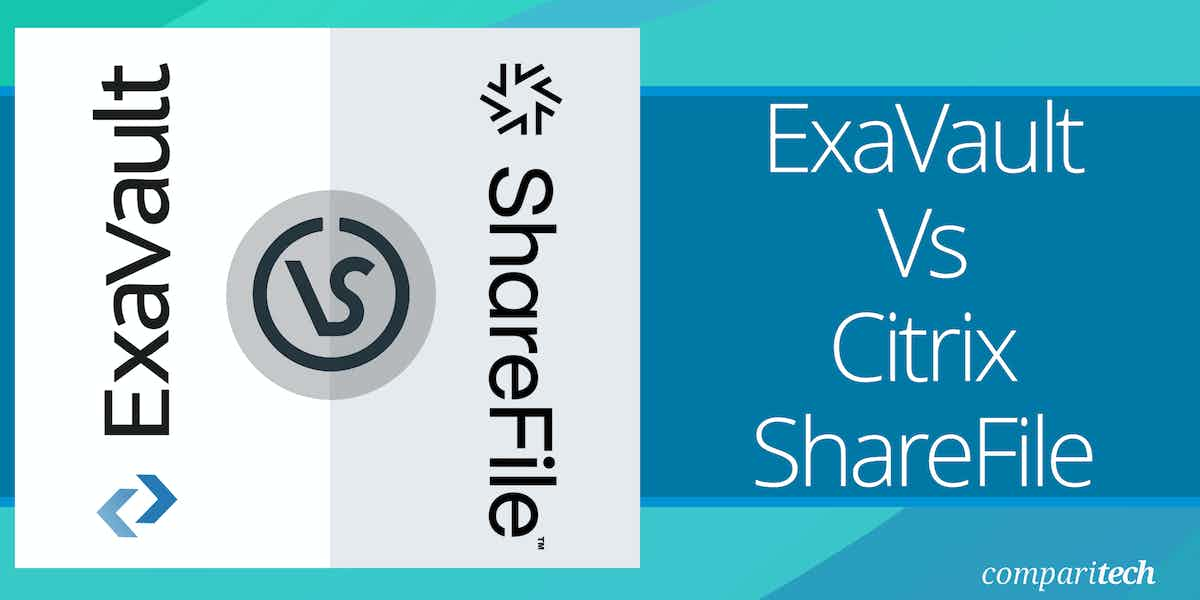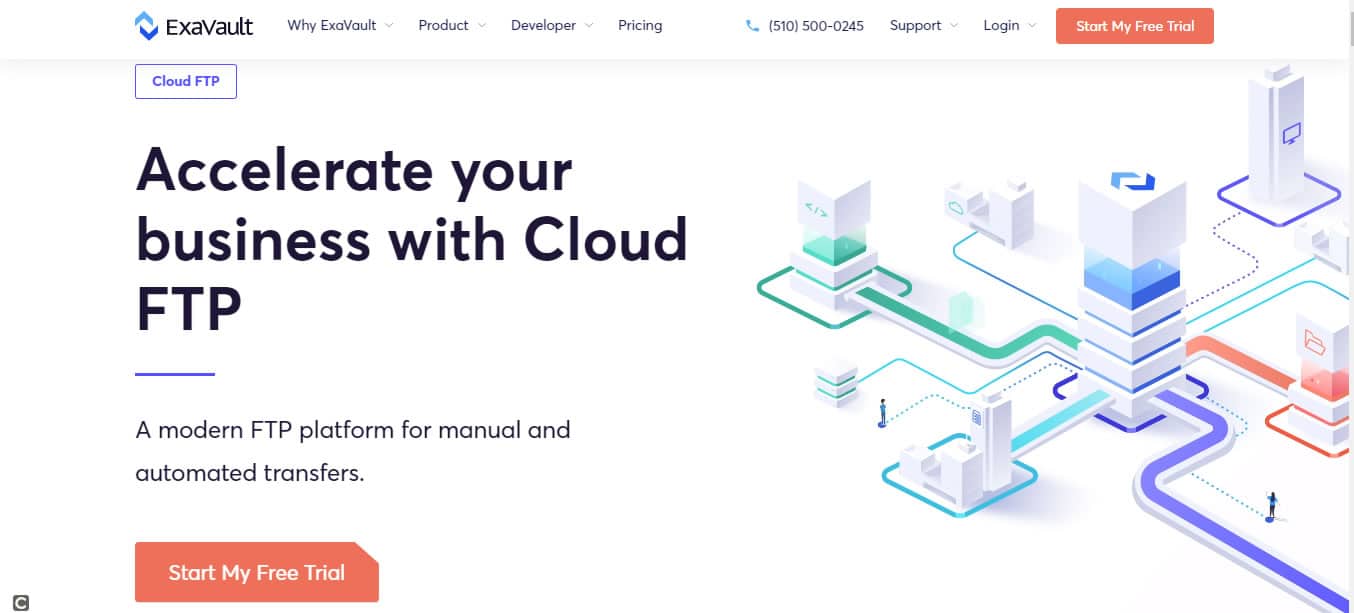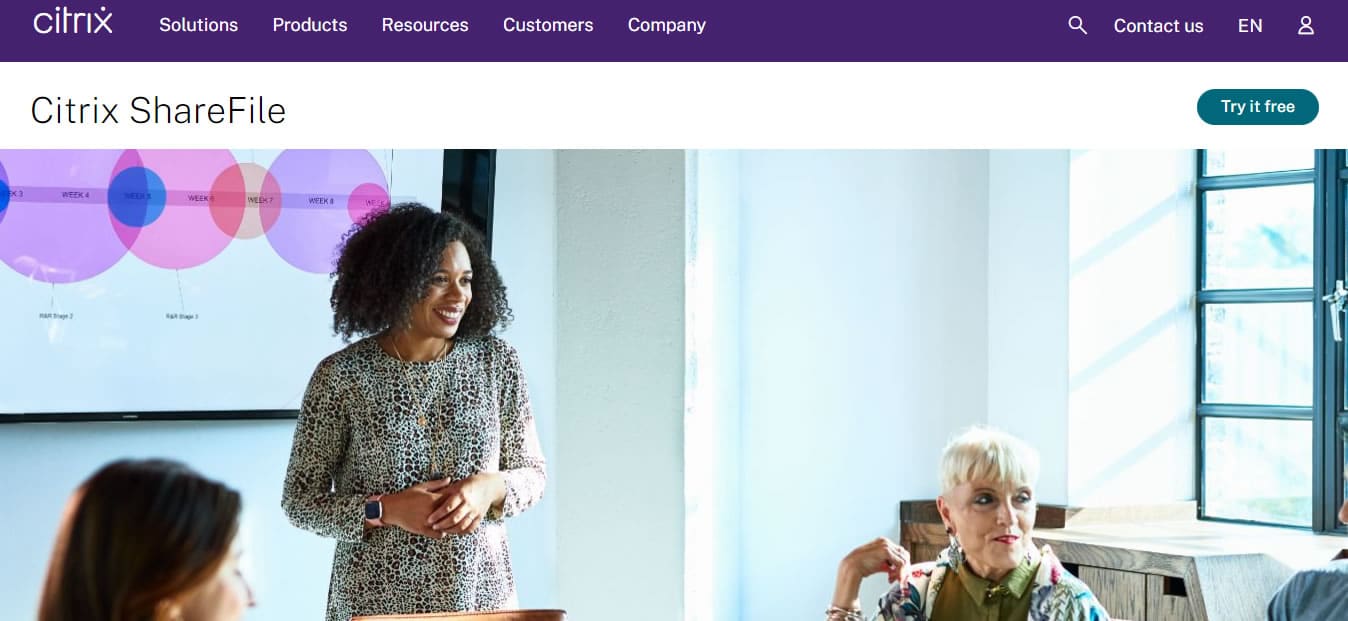Overview of ExaVault
ExaVault is a cloud-hosted FTP platform that enables organizations to securely store, transfer, and share files between users, teams, and organizations. The ExaVault FTP solution provides a robust and secure environment for transferring files over the Internet. It offers a range of features and functionalities that cater to the needs of businesses and individuals who require a reliable and user-friendly file transfer system. ExaVault is targeted at SMB and mid-market businesses and provides support for FTP, SFTP, FTPS, and FTP-SSL protocols. If you or your organization frequently works with large files and require a reliable and efficient file transfer system, ExaVault is an excellent choice.
In March 2022, ExaVault was acquired by Files.com — a U.S.-based cloud-native Managed File Transfer (MFT) service. However, according to ExaVault, it will continue to operate as a standalone platform in the short term, over the year until it is fully merged with the Files.com platform. Thereafter, ExaVault existing customers will be migrated onto the unified platform, and will get the following additional capabilities and benefits included with their subscription:
- SOC-2 compliance
- Global footprint: Your choice of 7 regions for file storage, including Europe, the UK, Australia, Japan, and Singapore
- Built-in Microsoft Office integration, supporting real-time co-editing
- Stronger security features, including encryption at rest, 3 more types of 2FA, and more compressive controls around IP lists, keys, and passwords
- Granular permissions capabilities
- Desktop app (Windows and Mac)
- Mobile App (iOS and Android)
- Command line app, better API, and SDKs for 6 languages
- Higher quality, instant search results
Exavault offers a free 10-day trial with full access to the entire platform, including all integrations, automations, protocols, and APIs. When you’re ready to buy, your trial environment will seamlessly convert into your paid environment.
Overview of Citrix ShareFile
Citrix ShareFile is a cloud-based content collaboration, file-sharing, and sync platform that supports all the document-centric tasks and workflow needs of small and large businesses. The goal of Citrix ShareFile is to help your team store, collaborate, send, and share files of any size, and on any device without compromising security. Citrix ShareFile uses a hybrid cloud model that allows for a separate, independent network for data storage and another for facilitating the services.
Citrix ShareFile offers a variety of features, including mobile apps for Android, iOS, and Windows Phone that enable mobile editing and offline editing of documents.
Other features and capabilities include, but are not limited to:
- The ability to manage sensitive corporate content on ShareFile using a remote wipe, encryption, passcode lock, and poison pill features.
- The ability to send and obtain e-signatures on documents with the integration of RightSignature
- The ability to send encrypted email through a Microsoft Outlook plugin or an online portal
- Custom Client Portal for your clients to upload and download documents
- Access and sync your files automatically, share data, and create time-saving workflows across any device.
- Office 365 integration allows for real-time co-editing and versioning
- Centralize content access to speed collaboration and simplify feedback and approvals.
- Option to store data in own data centers, Citrix-managed data centers, or use existing file storage systems via StorageZone Connectors
Exavault Vs Citrix ShareFile: How They Compare
Installation and Setup
ExaVault is a cloud-based FTP application, which means there are no installation hassles other than the usual sign-up process using an internet-connected device with a supported browser. The sign-up process is straightforward and can be completed in a few simple steps as shown below:
- Sign up and create an account Visit the ExaVault website and sign up for an account. You will need to provide your basic information and choose a subscription plan that suits your needs.
- Set up your workspace After signing up and logging in, you will need to set up your workspace. A workspace in ExaVault is essentially a container for your files and folders. You can create multiple workspaces based on your requirements, such as for different projects or clients.
- Configure user accounts As the account administrator, you can create user accounts for yourself and others who will be accessing the ExaVault platform.
- Connect to ExaVault Connect to ExaVault using your favorite FTP client software. Once connected, you can start transferring files to and from your ExaVault workspace.
Just like ExaVault, Citrix ShareFile is also a fully managed cloud-based service, which means there are no installation hassles other than the usual routine sign-up process. ShareFile cloud service is accessible by any computer with a supported web browser and an internet connection. To utilize all features and functions of the ShareFile web application, Citrix recommends the latest version of the following browser types: Microsoft Edge, Mozilla Firefox, Google Chrome, and Apple Safari. Once the sign-up process is completed, go to your folder, and you’re ready to start uploading and downloading documents.
Cloud Storage and Backup
Exavault isn’t designed for online storage and backup, but it performs this function indirectly. It is primarily a cloud-based managed file transfer application, which means its focus is on the secure transfer of files. This also implies that the huge amount of file data that passes through the Exavault network for file transfers is also securely stored on their cloud storage servers around the world. Uploading files, copying files, creating, or updating new versions all contribute to additional storage usage. ExaVault also allows you to create folders and subfolders within your workspace, enabling you to organize your files and maintain a structured file hierarchy. This makes it easier to locate and manage your files efficiently.
When it comes to cloud storage for small and large businesses, Citrix ShareFile stands out among the rest. Unlike others, Citrix ShareFile offers unlimited storage as standard across all plans. Citrix isn’t attempting to do away with your existing cloud storage platform, rather, it wants to work with them. Citrix uses what it calls Personal Cloud Connectors to let you connect to cloud storage platforms such as Box, OneDrive Business, Google Drive, and Dropbox to your account and see your files inside ShareFile. Citrix ShareFile also allows you to connect non-cloud-based storage platforms and collaborate in real-time with SharePoint support.
File Sharing and Collaboration
The real power of Exavault is made manifest when it comes to business-critical managed file transfer workloads. Within ExaVault’s user-friendly web-based interface, you can conveniently send files, share folders, receive files, and perform various tasks effortlessly. The intuitive design allows for seamless navigation, and the drag-and-drop feature simplifies the organization of your files. All your files and folders are accessible in a single, easy-to-manage interface. With streamlined file transfer operations, you can search, click, and share files effortlessly, enabling efficient collaboration and productivity.
A shared folder allows you to let outside parties access a folder in your account (including any files and nested subfolders) using just a link. A file send lets you send one or more files via an easy download link. File sends are different from shared folders because file sends are ‘point in time’-the recipient will get the files as you sent them. Sharing a folder with customers or colleagues is as simple as a single click, instantly generating a unique URL for the shared folder. You can conveniently send invitations via email or instant message to grant access to the shared folder directly from the interface.
In terms of performance, the ExaVault FTP platform excels at providing fast and efficient file transfers. It leverages multiple data centers strategically located around the world, ensuring that users experience reliable and speedy transfers regardless of their geographic location. This makes it an ideal solution for businesses with global operations or remote teams that need to exchange large files quickly.
You don’t need to look too far or too deep into Citrix ShareFile to know that file sharing is one of its greatest strengths, just as its name implies. The true value of Citrix’s cloud platform comes in sharing and connecting other cloud platforms to your account. You can share files by emailing them directly from your Citrix ShareFile account, by uploading files from your computer to a shared folder, or by generating a file link and sharing it with others, including those outside of your network. Citrix ShareFile allows you to set share permissions such as expiration date, receive a notification when someone uses the link, and what they are allowed to do with it. Such as viewing it online or downloading it to a local device. However, Citrix ShareFile does not have built-in features for tasks, comments, or online editing. To edit documents such as MS Word online, your organization must have a paid subscription to Microsoft 365.
Integrations and Extensions
With ExaVault’s RESTful API, you have complete control and the ability to automate various aspects of your account. This powerful API empowers you to perform tasks such as creating new users, transferring files, retrieving activity logs, and more. Additionally, ExaVault offers built-in webhooks that provide programmatically triggered notifications whenever changes occur. You can leverage web or FTP connections to seamlessly transfer files, and orchestrate all of these functionalities seamlessly using the ExaVault API.
Citrix uses several methods to let you connect with other applications and extend the capabilities of ShareFile. One of which is the use of connectors. ShareFile Connectors allow ShareFile users to access files and folders stored on a connected on-premises or cloud-based resource. There are several integrations available outside of Connectors, the most important of which is Zapier, which lets you connect Citrix ShareFile to lots of apps. Citrix ShareFile also provides native integration support to several other applications. Citrix provides an API platform that allows partners to integrate their applications with Citrix ShareFile. This allows the extensibility and integration of ShareFile with your existing enterprise systems and frameworks.
Security and Privacy
ExaVault prioritizes data security by implementing advanced encryption protocols during file transfers and storage. This ensures that your files are protected from unauthorized access and interception. The platform utilizes industry-standard encryption protocols to protect data during transit, ensuring that files are securely transferred between parties. Additionally, ExaVault offers advanced user management features, allowing administrators to set user permissions and control access to specific files and folders.
ExaVault provides support for user permissions (read-only, write-only, limit sharing, restrict to home folder, expire user), global permissions (Limit to FTPS/SFTP, IP restrictions, require two-factor authentication, comprehensive audit logs), and share permissions (expire share, password protection, require an email to access, download only mode, delivery receipts). Shared folders can be restricted; e.g. with an expiration date, password, download-only, etc. Share access logs to let you review who’s done what at any given time. It keeps you up-to-date with who has been in the share when it was created, and if any files have been downloaded.
Similarly, when it comes to security, Citrix ShareFile does everything within its power to keep your files safe and secure, including implementing two-factor authentication (2FA), single sign-on (SSO), encryption for data-at-rest and data-in-motion, OAuth token for apps that use the ShareFile API, Virtual Data Room for secure document storing and distribution, Citrix Analytics for threat detection and mitigation, remote wipe, device lock, and other advanced security features let you control how sensitive data is stored, accessed, and shared. Citrix ShareFile also supports integration with third-party Data Loss Prevention (DLP) and Cloud Access Security Broker (CASB) solutions.
Licensing and Price Plans
ExaVault offers affordable pricing options for businesses of all sizes. Its pricing plans are broken into Starter, Power, and Premier price plans as shown in the table below.
| Features | Starter | Power | Premier |
|---|---|---|---|
| Minimum User Commitment | 5 | Minimums Apply | Minimums Apply |
| Monthly Usage Included | 1 TB | 5 TB | 10 TB |
| Daily API Request Limit | 50,000 | 250,000 | 2,000,000 |
Table 1.0 | Exavault Price Plans
Plan pricing is partially based on user count, which means that you must commit to a minimum number of users. Charges are based on one total monthly number called “Usage,” representing your total billable usage of the Exavault service. This “Usage” number is the sum of your “Storage Usage” and your “Transfer Usage.”
Citrix ShareFile comes in three subscription plans: Standard ($50/month), Advanced ($80/month), and Premium ($122/month). Each of the ShareFile subscription plans is configured for five users out of the box. You can certainly add more users if you so wish, but it comes at an additional cost. There is also a separate plan called Virtual Data Room (VDR) that comes with features such as dynamic watermarking, click trails, view-only access, and others. The Virtual Data Room plan is expensive; but it is the ideal solution for businesses such as law firms, financial institutions, and software companies that deal with private confidential data that requires secure transaction processing. A 30-day free trial of Citrix ShareFile across all plans is available on request, with no credit card required.
L’article ExaVault Vs Citrix ShareFile est apparu en premier sur Comparitech.



0 Commentaires